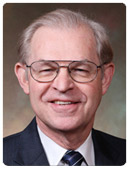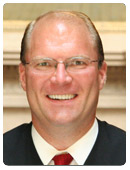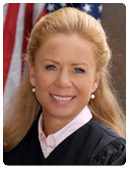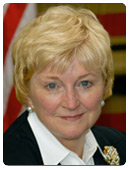The prosecutor leading the probe into possible coordination between Governor Scott Walker's campaign and outside groups has asked some Wisconsin Supreme Court justices to recuse themselves from hearing a challenge to the investigation.
A notation in court records titled "Motion for Recusal and Notice of Ethical Concerns" indicates that on February 12, Special Prosecutor Francis Schmitz filed a sealed motion for one or more of the Supreme Court justices to recuse themselves from the case. Schmitz was previously on George W. Bush's shortlist for U.S. Attorney and said that he voted for Walker.
A bipartisan group of prosecutors allege that the Walker campaign illegally coordinated fundraising and expenditures with Wisconsin Club for Growth (WiCFG) and Wisconsin Manufacturers & Commerce (WMC) and perhaps other groups) during the 2011 and 2012 recall elections. WiCFG director R.J. Johnson was also Walker's campaign manager when the state faced a series of nine recall races after the passage of the union-busting Act 10 legislation. Representatives of the campaign or the dark money groups could face civil or criminal liability if prosecutors find that they conspired to evade campaign finance disclosure requirements and contribution limits. (U.S. Department of Justice recently settled a criminal campaign coordination case in Virginia.)
The Walker probe has been subject to a barrage of state and federal lawsuits, and in December the Wisconsin Supreme Court consolidated four different challenges to the investigation.
The Center for Media and Democracy first identified the conflicts-of-interest facing some Wisconsin Supreme Court justices in April of 2014. The groups bringing the challenge to the probe, WiCFG and WMC, have been the dominant spenders in Wisconsin Supreme Court elections in recent years, spending over $10 million since 2007 to elect the Court's Republican majority. In most cases, the groups spent more than the candidates themselves. In two instances, the judges were elected by very narrow margins.
In Wisconsin, the decision to recuse rests solely with the justices themselves, and in 2010 the Court adopted rules drafted by the WMC declaring that the fact of a campaign contribution alone won't require recusal. Yet the level of spending by the groups in this case -- and their direct stake in the outcome -- could demand recusal under the U.S. Constitution, following the 2009 U.S. Supreme Court decision in Caperton v. Massey. A majority of the U.S. Supreme Court declared that where a donor "had a significant and disproportionate influence on the outcome" of a judge's election, and where an election was decided by a small number of votes, the risk of bias is significant enough to demand recusal.
The court record does not indicate which justices prosecutors are asking to step aside in the case.
According to CMD's analysis, WiCFG, WMC, and their offshoots spent $3,685,000 supporting Justice David Prosser in his 2011 race, five times as much as the Prosser campaign, in an election decided by just 7,000 votes. WMC spent five-and-a-half times as much supporting Justice Michael Gableman as Gableman's own campaign in 2008, in a race he won by 20,000 votes, and WiCFG also surpassed Gableman's campaign spending. WMC and WiCFG together spent twice as much as Justice Annette Ziegler's campaign in her 2007 race, and WMC and WiCFG together outspent Justice Patience Roggensack in her reelection campaign last year, but those races were not as close.
Plus, if the justices hear the case and strike down the coordination rules, their campaigns could take advantage of the newly-lawless electoral landscape. In future elections, the same justices who will be deciding whether Wisconsin’s coordination rules are constitutional could work hand-in-glove with the same groups that are bringing the challenge to those rules. When Justice Annette Ziegler is up for reelection in 2017, her campaign could coordinate with WMC, which spent $2.5 million on her last race. When Justice Michael Gableman runs again in 2018, his campaign could coordinate with Wisconsin Club for Growth, which spent at least a half-million when he first ran for the Court.
Here is a recap of the recent Wisconsin Supreme Court races and the money spent:
Justice David Prosser

Supreme Court Justice David Prosser
In 2011, Justice Prosser narrowly won reelection by just 7,000 votes, in a race widely viewed as a referendum on Governor Walker's controversial union-busting legislation. Prosser's campaign spent only $700,000. WMC spent $2 million helping reelect Prosser, according to its own numbers. A new front group, Citizens for a Strong America, came out of nowhere and spent $985,000 backing Prosser and attacking his opponent. Donations to the group were not disclosed, and it was only discovered years later that the group was entirely funded by Wisconsin Club for Growth. Wisconsin Club for Growth itself spent an estimated $520,000 supporting Prosser.
Together those groups spent five times as much as the Prosser campaign, in an election decided by just 7,000 votes. All of their spending was undisclosed "dark money."
Notably, a letter later obtained through an open records request showed Justice Prosser thanking a GOP donor who worked on his campaign, telling him that "the coordination you provided with organizations outside the Republican Party [was] absolutely indispensable." The same donor boasted to Governor Walker's office about his efforts to "get very creative with diverse State and National organizations to help [Prosser's] campaign due to being financially capped at $300,000." Some have read the email as suggesting coordination between Prosser's campaign and independent groups -- an issue whose legality the Wisconsin Supreme Court will be asked to resolve.
Justice Michael Gableman

Michael Gableman
Justice Gableman won his 2008 election by around 20,000 votes. The Gableman campaign spent only $411,000 -- but WMC spent $2.25 million in undisclosed dark money getting Gableman elected, nearly five-and-a-half times as much as the justice's own campaign, according to WMC's own numbers.
Wisconsin Club for Growth also surpassed Gableman's spending, dropping over $500,000 in undisclosed spending to help put the justice on the bench. Another phony issue ad group, Coalition for America's Families, which received funding from Wisconsin Club for Growth and shared a board member, spent $480,000 supporting Gableman that year.
Justice Annette Ziegler

Annette Ziegler
The 2007 elections marked a turning point for big money in judicial races. Justice Ziegler's campaign spent $1.4 million, and she won by 145,000 votes. WMC made an eye-popping $2.5 million in undisclosed expenditures supporting Justice Ziegler's campaign, according to its own numbers, making it the biggest spender in the race. Wisconsin Club for Growth added $400,000 in dark money. Together they more than doubled the amount spent by Ziegler's own campaign.
Ziegler faced ethics charges from the Judicial Commission in 2007 for failing as a circuit court judge to recuse herself from cases involving a bank whose board included her husband. The Supreme Court had the final word on the matter -- after Ziegler had been elected to the court -- and issued the first public reprimand of a fellow justice in the court's history, calling her failure to recuse "serious," "inexcusable," and a "bright-line" violation of judicial ethics, although many viewed it as a slap on the wrist.
Justice Patience Roggensack

Patience Roggensack
In the 2014 Supreme Court race, WMC spent an estimated $500,000 supporting Justice Roggensack's reelection, and Wisconsin Club for Growth spent $350,000. Together they outspent the $652,318 spent by the justice's own campaign.
WMC issued a special Supreme Court edition of its "Business Voice" magazine in advance of the election, with page after page warning that if Roggensack were to lose, "all of the reforms of Governor Scott Walker and the business community would hang in the balance." WMC's president described the group's efforts to "elect 'strict constructionist' judges to the high court," and Justice Ziegler penned an op-ed endorsing Roggensack.
For more about the John Doe investigation, see CMD's reporting on PRwatch.org






